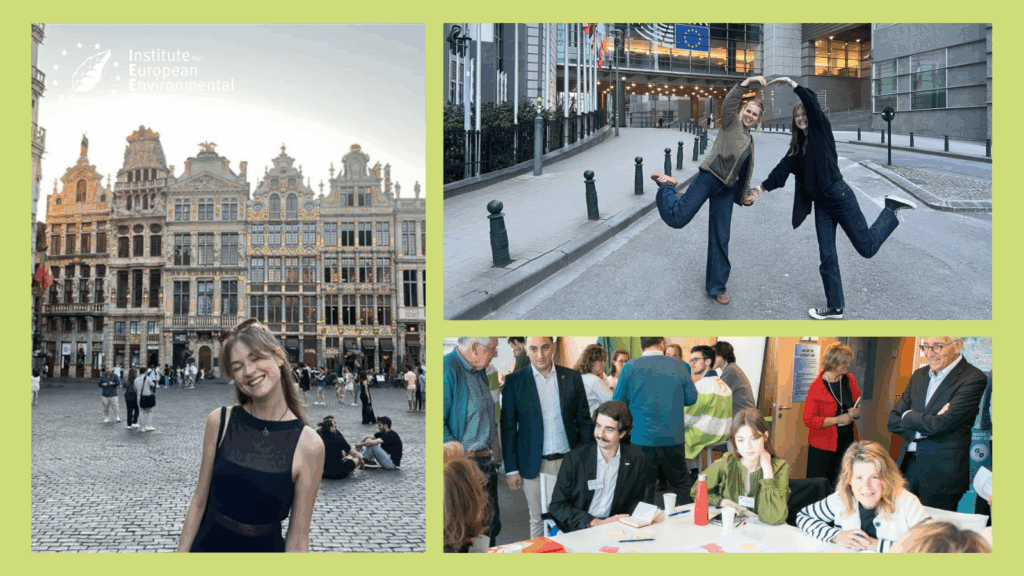Hi, I am Ewa Jarosz, currently studying Master in Public Policy, specialising in Social Policy and Social Innovation at SciencesPo
I joined IEEP at a difficult time for the EU – the simplification of CBAM, the postponement of Corporate Sustainability Reporting, and the Polish presidency backed both the watering down of CSRD and the simplification of CSDDD, among others. In this landscape, I took my first step into environmental think tank work. I was feeling quite down myself and expected the atmosphere in the office to reflect that. Instead, I found a group of positive, but most importantly, realistic, experts who genuinely believed in what they were doing. Despite the direction in which funding and policies seem to be heading, I realised how much there still is to be done – on how many fronts the team is working on, and how big their impact on policymaking still is.
I joined the Climate and Circular Economy team. I first got to know IEEP after attending a lecture by Chiara Antonelli (the Head of the programme) on public support for low-emission zones at SciencesPo. That topic – public support, political communication, and the social aspects of environmental policy – have been something I was interested in for a long time. During my BA in Applied Sociology and Cultural Anthropology, I focused on these exact themes, especially while writing my thesis on the public perception of youth environmental movements, analysing both public sentiment and activists’ engagement strategies. Now, while studying Social Policy at SciencesPo Paris, I’ve become particularly interested in just transition and the social impacts of environmental policy – so, during the interview, when I got to know what my tasks will be in this student programme, I could not help but smile.
Getting this opportunity also meant moving to Brussels. The city’s well-known bad PR had made me a little scared, but to my surprise, I became completely enchanted. I love its diversity – cultural, architectural, and landscape-wise. The number of free events in music, art, and culture is overwhelming in the best way. Architecturally, it felt like a breath of fresh air. From Art Nouveau, through art deco and to brutalist towers like those around Gare du Nord – Brussels was an urbanistic contrast (and don’t get me wrong – the social contrasts in the city are extremely alarming) to the uniformity of Haussmannian Paris, where I’ve spent the last year. And the people! I’ve rarely met so many people that are so passionate about what they do, and with interests so close to mine. Making friends has been easier than ever, and I’m still in touch with many.

But back to the internship itself. –I covered a multitude of tasks; from updating policy logs, to tracking EU climate legislation, and learning the details of it (and there’s a lot of it).
Then came project work, right after struggling with learning the difference between a grant and a service contract and getting to know how Horizon projects work, I contributed to proposal development – researching the context and identifying relevant case studies for projects focused on public support, social impacts, and related policies. Working on these proposals, and translating research into policy, was exactly the kind of work I had hoped to do. It’s what I find so valuable about IEEP.
Of course, I wasn’t just sitting at my desk (although the desk was very comfortable and nicely lit). Being part of IEEP also meant helping organise events – including in the European Parliament, with MEPs and policymakers. One of the most interesting parts of my job was assisting with the “Science4Policy” briefings, where scientists and stakeholders present the latest environmental research to EU officials. It was fascinating to see how science and politics meet, sometimes clashing. Later, along with other students, I helped in drafting policy briefings (like this one or this one) synthesizing those diverse perspectives into coherent recommendations. I also attended lectures and seminars as a representative of the CCE team, gaining insight into the work of NGOs and civil society actors, and expanding my network (and circle of friends), something that wouldn’t have been possible had I not been in Brussels.
So, though the programme can be completed remotely, I’m very glad I chose to be in the office most days. The atmosphere – and all the informal learning that happened during lunch conversations or by overhearing discussions – was as valuable as the formal tasks. I’m deeply grateful to IEEP for the opportunity to learn from them and expand my understanding of climate policy. Coming from Poland, where, as our Presidency sadly showed, climate action is still not taken seriously, and after years of being involved and interested in activism, seeing how environmental think tanks and advocacy can shape EU-level policy has been both inspiring and motivating.
I want to especially thank Chiara Antonelli and Emma Watkins, who ensured that I have tasks to work on and I’m learning something, who supported me, and patiently answered my (many) questions; Irene Chiocchetti and Mattia Bonfanti, for their help and kindness; the entire IEEP team for being so welcoming; and the other students – Amalia, Paloma, and Nora – for making the experience way more fun than I had expected.
Thank you!
IEEP strongly believes in supporting the policymakers and environmental experts of tomorrow. As part of our educational mandate, IEEP is happy to host students in partnership with their Universities as part of their programmes. If you would like to find out more, contact us at brussels@ieep.eu
